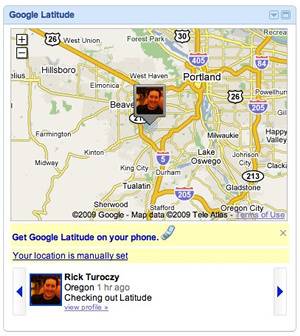Where you are is as important as what you’re looking for. That’s why more and more services are looking to location as a filter for providing relevant information when and where we need it. So it only makes sense that Google – a company known for its ability to deliver relevant information – get into the location-aware app game. Today, they jumped in with both feet by releasing Google Latitude, a way to keep track of your friends’ current whereabouts – and let Google have a view into your nomadic or sedentary habits.

Google Latitude allows you to share location-based information with friends. And it’s incredibly easy to get started. Simply install the app on your smartphone (no iPhone yet) or iGoogle. You have the option of sharing your location by dynamically updating the service using your phone or by manually updating your location on the Web.
Knowing where people are is great. Being able to get ahold of them is even better. That’s why Latitude also lets you interact with them by providing access to SMS and IM or allowing you to call them.
It’s All About the Data
While many of us have grown used to providing details on our travels by updating location-aware apps like Brightkite or checking in with sites like Dopplr, those journeys have always been loosely affiliated with the rest of our habits – through a lifestream, at best. Today, with Google gathering this information, it changes the picture entirely.

For millions of users, Google already knows how they search, what they click, what they buy, who they know, how they communicate, and where they go on the Web. Location enables them to add another critical data point – where they are when they’re performing any of those actions. So if you think Google has too much information about you already, you’ve got another think coming.
Long story short, Latitude adds a whole new level of complexity to Google’s understanding of you and your habits. And while we’ll no doubt derive some very interesting benefits from sharing that information, we should hold no illusions about the value of that data to Google and its efforts to run a profitable business.
But, in Google’s defense, they’ve also worked to ensure you have a way to opt out of the service and maintain complete control over your privacy. Katherine Boehret of The Wall Street Journal, who has had the opportunity to test drive Latitude for the past week, also gives a nod to those opt-out features:
“Usability issues aside, location-based services like Latitude can be just plain creepy, especially when a Big Brother like Google is tracking your whereabouts. So Google incorporated easy-to-change privacy settings so that locations can be automatically detected, manually entered or completely hidden from other people. Or people can sign out of Latitude altogether.”
Do No Evil, Please
It was only a matter of time before Google entered this market, and no doubt millions of people will soon be flooding the service with their up-to-the-minute location details. With the combination of Google Maps, Google Latitude, Google Friend Connect, and Android, it’s not very difficult to begin daydreaming about the potential for this service.
But it’s also a leap of faith as a user, entrusting Google with yet another piece of data that helps them figure out the puzzle of understanding you – and how and where you’re likely to perform actions that put money in Google’s pocket.
It will be interesting to see where Google goes with this one – and interesting to see where you’re going, now that we can look over your shoulder.
Update: See our follow-up analysis Did Google Just Kill All the Other Mobile Social Networks?

















